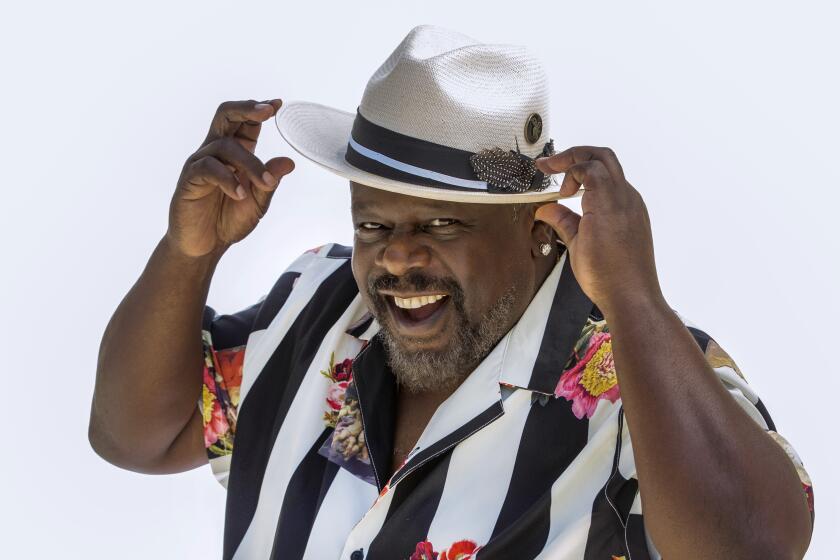SHOCK RADIO CRACKDOWN JOLTS INDUSTRY : FCC Attack on Alleged Indecency in Broadcasting Will Reach Into Recording Studios, Television and Theater as Well, Say Critics of New Policy
The Federal Communications Commission crackdown on shock radio shocked the entire entertainment industry Friday, not just the three radio stations criticized in a Thursday press conference in Washington, D.C.
The FCC’s immediate focus is on the alleged indecent broadcasting of so-called “raunch radio” deejays, modeled after the practice of New York shock-jock pioneer Howard Stern. But the newly announced policy spills over into the recording studio, television and even the stage, according to broadcasters and others in the entertainment industry who are wrestling with the new FCC definitions of obscenity.
The FCC on Thursday asked the Justice Department to consider criminal prosecution of KPFK-FM, a nonprofit Los Angeles radio station, for broadcasting an allegedly obscene play, and also issued written warnings to KCSB-FM in Santa Barbara and WYSP-FM in Philadelphia. Officials of all three stations cited offered varying degrees of opposition to FCC general counsel Diane Killory’s Thursday announcement that the commission would begin taking steps to ban obscene and indecent programming on radio and television. But the on- and off-the-air responses at the three outlets on Friday were as different as a snide quip from a drivetime deejay and a dead-serious deliberation by a gay playwright on the tragedy of AIDS.
Stern’s morning drive-time program, simulcast over WYSP-FM in Philadelphia and WXRK-FM in New York, remained unaffected by the announcement Friday, according to attorney Steve Lerman, who represents the Infinity Broadcasting Corp. Infinity, which owns 11 radio stations including KROQ-FM (106.7) in Los Angeles, will have “no pre-screening policy,” according to Lerman, despite the FCC’s condemnation of Stern’s program.
“Stern is given guidelines he must follow in advance,” Lerman said. “Under the pre-existing FCC standards, Stern was abiding by the law.”
Though Infinity will review its standards in light of the FCC announcement, Lerman said he believed Stern’s show would remain basically the same.
Indeed, Stern launched his Friday morning show by blasting the FCC ruling and following the three-point “Howard Stern Credo” published three years ago in an interview he gave to the trade publication, Radio and Records:
--”I’ll do anything . . . just about anything.”
--”My show has been successful because I have broken format.”
--”It’s really funny what upsets people.”
Stern insulted an ABC reporter who had come to the WXRK studio to interview him on the FCC issue, poking fun at the reporter’s Hispanic surname and spending several minutes deriding Puerto Ricans.
When asked if he was trying to alienate his audience, Stern said he had no one left to alienate because he had insulted everybody. Asked if the FCC crackdown might affect his career, Stern boasted that it was the greatest thing that could have happened to him. He predicted that his show’s ratings, already among the highest in New York, would go even higher.
“I’m not nuts about the Howard Stern show, but I couldn’t beat him in New York because I wouldn’t stoop that low,” said Jay Thomas, the morning shock jock at KPWR-FM (105.9), currently the most listened-to station in Los Angeles.
Thomas was a morning deejay in New York on a competing station before he came to Los Angeles last fall. His name and picture appear on RTD buses under the advertising line “We apologize for Jay Thomas this morning.” Like Stern, Thomas uses sexual innuendo and ethnic insult as part of the humor in his daily program, but even Thomas admits:
“I’m dishwater compared to (Stern’s) kind of stuff.
“The shock radio style is being served by this decision,” he said. “My style is just to entertain. If they took time out to nail me, I’d be shocked myself.”
Jeff Smulyan, president of Emmis Broadcasting, which owns KPWR, said he is “a little concerned,” but not with Thomas.
“I get very nervous about government people censoring things, but on the other hand there are some people (on the air) who have stepped over the line,” he said.
The station that stepped over the line, according to KPWR officials, is KPFK-FM (90.7) in Los Angeles.
KPFK--which aired a late-evening program called “The Jerker” by Michael Kearns on gay love and AIDS last summer--was the target of the most serious FCC charge. Killory went so far as to say that, of the three cited stations, KPFK would actually be referred to the federal Justice Department for possible criminal prosecution on obscenity charges.
“The FCC has charged us and judged us and accused us of being criminals without consulting us,” said David Salniker, executive director of the Pacifica Foundation, which owns KPFK. “They took this action without ever holding a hearing, without letting Pacifica or any of the other broadcasters call a single witness.”
Salniker and other Pacifica officials defended the broadcast on grounds that its references to oral and anal sex and its explicit language served the interests of the substantial gay population in the station’s listening area and their concern about acquired immune deficiency syndrome, which destroys the body’s resistance to disease.
But the Rev. Larry Poland of the Trinity Church in Redlands disagreed.
In a September letter to the FCC, Poland quoted what he described as a play detailing sexual fantasies of homosexual men and provided word-for-word descriptions of the KPFK broadcasts, which he said offended him.
“When I heard the initial ‘F’ word and I heard them describing sex acts with males and females, oral and anal intercourse and street language, I frankly didn’t care about redeeming social value,” he told The Times.
Poland, a 47-year-old minister and father of six, said the KPFK broadcast “wasn’t even marginal” when it came to obscenity and promised to see the FCC referral of his complaint through to a hearing before the Supreme Court if necessary.
The third FCC complaint was leveled against KCSB-FM (91.1), the student station at the University of California, Santa Barbara, where a deejay played a record by the Pork Dukes called “Makin’ Bacon.” Obscenities in the song referred to oral and anal intercourse.
“There are other songs of that caliber that we have aired,” said general manager Malcolm Gault-Williams, who believes that the FCC is using all three stations to narrow “the definition and scope of what the commission considers to be decent.”
“Clearly, they want to send a message to non-commercial radio stations that they want a tightening up of broadcast material having to do with reference to sex and profanity. We have gotten complaints about our programming, but mostly positive feedback.”
He said he has not yet heard from university officials on the FCC announcement.
“Unless I hear otherwise from my employer (the university), that they want to appeal, we have no other choice but to comply with federal law and make those changes. What that boils down to for us is a banned-records list. If a record or song is on it, deejays will no longer be allowed to play them.”
Staff writer Deborah Caulfield and John Voland also contributed to this story.
More to Read
The biggest entertainment stories
Get our big stories about Hollywood, film, television, music, arts, culture and more right in your inbox as soon as they publish.
You may occasionally receive promotional content from the Los Angeles Times.






